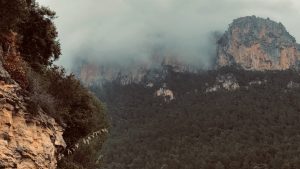Maintaining Balance while Facing Negativity – Part II
The Attitude of a Spiritual Warrior
by Igor Kufayev
STUDENT: To live a virtuous life, there is a very helpful task in life – svadharma. Besides me, I see a lot of people struggling to find a svadharma. When I asked you this question in London, you said something like “Don’t worry too much. In the mystic path, one day, it will fit.” And last week, I heard a discourse from Swami Devananda Giri who spoke with you in Vienna. And he made my mind very puzzled with his definition of karma yoga. The definition I knew was: whatever comes, take it as a prasad. He said, “This is fine, but it’s for beginners. Actually, karma yoga starts when you get an immersion from wherever your svadharma gets transmitted to you.” So in Tantra do you also get a svadharma from somewhere and then know what to do? Because if you don’t know where to put your energy in daily life, you get confused, and then the asuras come also.
IGOR: There is a place for the heroic act. It doesn’t matter whether there are peaceful times, the role of a warrior, kshatriya, or samurai, is to constantly maintain good form. So the fact that there is peace, doesn’t mean that one just completely buries the sword and grows apples, so to speak, and forgets about the purpose that one is born to protect. Of course, it’s a metaphorical example. But there is also a saying that “It’s better to be a warrior in a garden than a gardener on a battlefield.” So it is then translated into the job of a spiritual warrior, which also, in the age we live in, is lacking in understanding, so that we still have to go back to the upayas; and this is where, in my view, the satsang movement and nonduality fell on its face because it had the audacity to implement the highest no-means upaya for every Tom, Dick, and Harry, forgetting that that is completely inconsistent with how things are.
So the attitude of a spiritual warrior that I share is precisely this. You train, and you maintain good form. It doesn’t matter if these are peaceful times. It doesn’t matter. The spillover of spiritual practices into the domain of the householder is an interesting phenomenon. If we go back in time, spiritual practices were not performed by householders. If we go back in time, there were monastic communities, little satellites, here, there, elsewhere, in different cultures, and they performed their role. Monks gathered together – they meditate, they chant, they sing, they vocalize, and everything else happens in accord with the dharma. Whether this is China, India, doesn’t matter – Middle East, North Africa, Europe. But in our time, it seems that all this is kind of in that intermixture, in that fusion. There’s not just a tremendous interest in spirituality, but also awakening is becoming more commonplace. How will it go then? That’s a different story.

So, there is a possibility that because of the demographic explosion, there are so many more human physiologies, and here is where a lot of things can happen. In the Sufi tradition, there are one hundred enlightened beings – one hundred keepers of light – who have to be maintained. It’s most likely an allegory rather than to be taken literally that it’s one hundred persons. But as tradition speaks about it, it has to be maintained. So in other words, at all times, there’s one hundred keepers of light. Once one lifespan is extinguished, immediately it is being replaced. The exponential explosion in population creates the possibility that for every city the size of, let’s say, London – which is a multi-million person city – there would have to be quite a few people who have to carry enough consciousness for everyone to enjoy it, and to maintain the balance. It’s simply inconceivable that only a handful of people get truly enlightened, awakened, and carry this consciousness, because then how could that balance be maintained? Who receives the offering? How can the offering be received?
Meditation can be seen in so many different ways. Sometimes, people get kind of jaded. However meditation is one of the most superior and supreme forms of offering. And through that offering, very subtle fields partake – subtle forms of energy which we otherwise do not receive. At the level of life we live in, at the gross level, a lot of energies are received. Anytime someone sells apples, there’s an exchange – pears, apples, potatoes, Cartier watch, Lamborghini – there’s a deal being made. There’s some exchange of energy, and some beings enjoy and receive, at some gross level. There’s a lot of that at the moment, right now. Life is so rich in terms of its expression – just look around. But these other levels of creation need to receive as well. Therefore, there have to be poets; there have to be artists. If every one of us would become a businessman, it’s kaput. It’s the end of life, if all of us become that. There have to be Mozarts around. There have to be really creative vagabonds.
So you’re talking about svadharma. There have to be those who whirl in ecstasy so that that businessman who works at the stock market gets a little bit of something when he goes to sleep. Because we are all interconnected, completely interconnected. The saint and the criminal are just categories, all categories of Awareness. You have to meet this halfway. Make a step towards that understanding. Because it is in you where this reconciliation takes place—only in you. So I don’t know exactly what was the take of Swami Vishnu Devananda Giri on the karma yoga in terms of receiving the svadharma.
STUDENT: He said that in meditation you can receive, through a vision, your svadharma.
IGOR: Yes, this could happen. Of course it could happen. But I don’t know why this is called karma yoga. Karma yoga, if we speak about it as it is spoken of in the scripture which defines karma yoga – in the Bhagavad Gita – then karma yoga is the freedom from the binding influences of one’s actions. It’s a freedom from identification that comes with any action. So karma yoga properly speaking here has two, if you will, points of view: one is, as a practice, where one simply gives oneself to the practice of karma yoga, where one consciously forgoes any desire or hankering for the fruits of one’s actions. One simply acts for the sake of action, not for the sake of the fruits that actions bring. This is the rule of thumb upon which karma yoga rests. So this is first; this is a prerequisite. This is where karma yoga is met. And at the ultimate level, or the level of actualization, karma yoga is gaining the witnessing state of consciousness, because in witnessing state of consciousness, that prerequisite is automatically met – that prerequisite of remaining unattached to the fruits of one’s actions. It doesn’t matter how it sounds when one may say, “oh I’m doing this, I hope it’s going to be successful.” If one is established at this level of consciousness, then it’s only at the level of how it’s spoken of, but the internal experience is completely different. It makes no difference what will happen, how it will happen, because action is performed for the sake of action in a state of witness.
I don’t know what other perspectives on karma yoga there are, in the sense that receiving one’s svadharma in meditation is seen as a real karma yoga. To me this sounds a little bit complicated because karma yoga is the beginning—yogas unfold from karma yoga. The first yoga is the yoga of despondency. Arjuna Vishada yoga is the yoga of despondency. So before the yoga can begin, there has to be this admission that we’ve traveled that far, and that now we cannot go on of our own devices. This is where Arjuna throws an act, “I’m not going to do it!” puts his weapon down, sits down and says, “I’m not going to fight” – because he’s bewildered. Despondency, here, is meeting the paradox where one cannot reconcile the calling of duty – what one is born to do – with what one feels is right. You see? It brings about that conflict. And that conflict results in despondency, because one faces this paradox: “I don’t know what to follow. Do I follow my duty as a warrior and enter the battle and just use my skills? But I also feel and see that this is completely pointless and my heart swells with compassion and this is an act of unrighteousness. Why would I want to do that?”

STUDENT: Arjuna at least knew that he’s a warrior, and this is a lot.
IGOR: Well, you are a spiritual warrior. So take this as an invitation: become professional about it, literally, and not just doing it on Sundays. At some point, that’s what this is really all about. You see? And I would then be inclined to say that then svadharma would present itself in a natural way. Not everyone receives this download. You know like, “Okay, you now go and tell your people that you’re going to take them through the Red Sea back into the land.” Not everyone receives these commands. Not everyone receives this download like, “Okay you’re going to be the next big film producer.” “Sorry, God, you serious? Come on. Me? Film producer?” No, I don’t want us to have these kinds of expectations. Karma yoga is karma yoga. Being established in karma yoga is being established in witnessing state of consciousness, the cosmic state of consciousness. Karma yoga is fulfilled here. Karma yoga is simply acting for the sake of action. And this is also what cultures, if you will, and brings about the possibility where our action is freed from this hankering which reinforces this identity with an actor. That identity is constantly being reinforced. It’s like deal-making. That deal-making keeps us prisoners to that which is spoken of as the wheel of samsara, with karma being the main mechanism that makes the spokes of samsara rotate.
So the dilemma of receiving that svadharma, as you have rightly pointed out, is the very sign of our age, the sign of our time. A lot of people are clueless as to what to do with their lives, especially if they don’t want to just follow on autopilot. If we go a little bit back in time – just a little bit, say one hundred years ago – if you’re born into a certain family, as a man, then you have to have either a military career or the career of a lawyer or a doctor. It was all depending on what strata of society you were born into. If you’re born somewhere on a farm, then you’ll be a farmer. This is no longer the case. This is now the fusion spinning so fast, but all this has nothing to do with svadharma. People are confused if they think that what they’re doing defines in any way their purpose. People think, “Well I’m going to do this or that.” This is precisely what it is: it’s the sign of our time where one has to simply have this degree of, if you will, courage, where one needs to trust what one would like to do given favorable circumstances. In other words, this is where we invite the possibility of bringing about this, let’s say, creation of our own reality, creation of our own dream. But then of course, it’s not getting lost in that daydreaming of “if only.” But there has to be this opening as well. “I would love to do that, if the circumstances were to allow me. What I need to do right now may completely have very little to do with it, but I have to do this.” So do it at the level of karma yoga, do it as a must. Simply go about your daily life with that attitude, because you have to take care of yourself – because this is also the reality.
So therefore, I will never tell anyone: “Oh, just start meditating seven hours a day, eight hours a day.” It’s irresponsible. People ask me, “So if I meditate more, more, and more, will I be able to..?” No, it has to come spontaneously. The circumstances of our life have to fall in such a way that our sadhana can become the only and single focal point of our attention. It’s a luxury. And it’s not given to everyone. And one does not always recognize that. It takes a lot of courage. It’s the same with any project. Why is it different with a spiritual project? How many examples do we know of people investing their last penny in what they love doing? If this is their svadharma, then that’s what they’re born to do.
So therefore, one way or the other, I would not advise you to look for some kind of easy solutions, or some kind of downloads. Just maintain what you need to do. You have that boss, but if you have to do something—do it! If you’re completely fed up with it, then create an opportunity within yourself to open other possibilities in your field. You’d be surprised what is possible at that very, very subtle juncture point where the intention has extraordinary power, because when consciousness is enlivened, a lot of things are possible. When consciousness is dormant, everything seems like: “only this is possible.” When consciousness is dormant, there’s only this way you can go, or only that way you can go. In India, there is this saying like, “The enlightened being does not go by the roads.” They go through the field, even if a cabbage grows there, they go straight through. And you cannot tell them “Hey, hey, you’re walking through my garden!” It’s like part of the culture. I’m not saying,“Trespass through someone’s territory!”

For a prolonged time, I did not know what I would do. For a very long time. And that came after knowing very well what I was doing before. The breakthrough was so profound that there was no such thing as, “okay, well you do this.” I never recommend that to people unless they feel a very strong sense backing them up from within. I didn’t have one single person around me who actually supported that. People were really trying to straighten me up, “You’ve got to really get it together! What on earth are you doing?” But for the first couple of years, I simply couldn’t do anything. The intensity of bliss was so profound that, literally, going somewhere or doing something, was impossible – physically, virtually impossible. But then when the integrating phases began to come, there was more energy for other things, for interactions and for wondering what I would do. I had no idea, no clue. And I was not interested in anything. All I was interested in was knowledge, knowledge, knowledge. I would eat scripture for breakfast. That was there for sure.
So somehow the guidance was always there. But I didn’t know what I would do. I didn’t know I would hold space like this. I sincerely didn’t. There was no inclination, no indication of that. And of course, I postponed and kind of pushed it away for as long as I could. But I also have met people, a lot of people, who did not know what to do, who went through these states of limbo, completely. Remember when we speak about unplugging and rewiring? It’s part and parcel of that. And then new connections begin to be developed, because we cannot live without these connections. So this rewiring – keeping good company, keeping satsanga – it’s what will bring about, naturally, where your svadharma is. But in the meantime, you sharpen your sword, keep it sharp, and practice these moves [demonstrates downward slicing motion].
– Igor Kufayev, Q&A dialogue during the 5 day meditation immersion in Mallorca in November 2019.
Images: Courtesy of Flowing Wakefulness.
